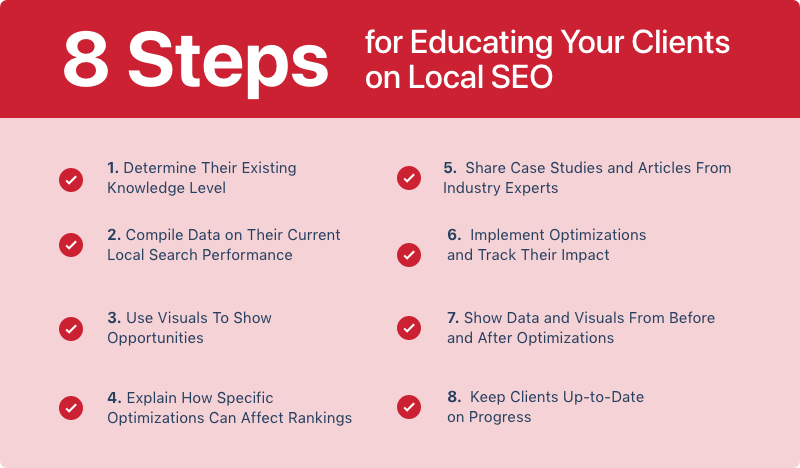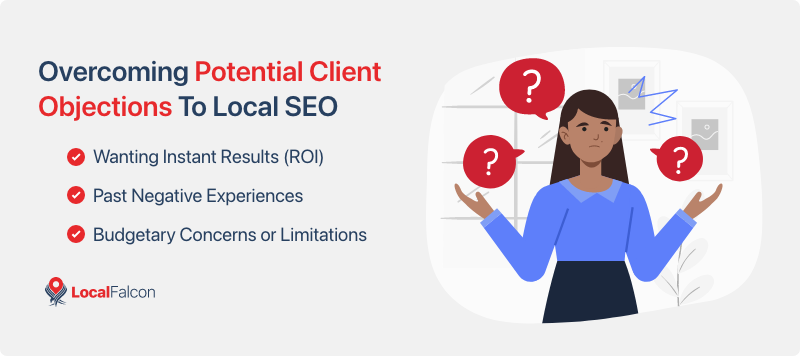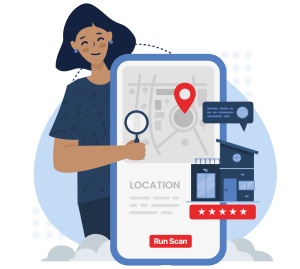For local search marketing agencies, educating clients on local SEO is a major key to client retention and, ultimately, agency growth.
Without proper education, the true value of your local SEO services may not be clear to clients, and both you and they could potentially miss out on opportunities for continuous growth.
On the other hand, if you explain local SEO clearly and make sure to visually demonstrate the value of your services using tools like geo-grid rank tracking, you can increase your clients' buy-in for local SEO services, strengthening relationships and opening doors to more opportunities for long-term growth.

8 Steps for Educating Your Clients on Local SEO
1. Determine Their Existing Knowledge Level
Before diving into local SEO explanations, assess how much your client already knows. Some business owners may have prior knowledge, while others may have little to no understanding of SEO, especially its local-specific aspects.
Additionally, many business owners may have had bad experiences with previous SEO providers who made misleading promises or failed to deliver results. Be mindful of any skepticism and focus on clear, transparent education that builds trust.
2. Compile Data on Their Current Local Search Performance
Providing a baseline for clients' local search presence is crucial. Using a local rank tracker like Local Falcon allows you to benchmark their performance objectively. Showing them where they currently rank for key search terms in their service area(s) helps set the stage for demonstrating potential improvements.
3. Use Visuals To Show Opportunities
Local SEO can feel abstract to many business owners, so using visual tools like geo-grid rank tracking helps make it more tangible. These visuals show where their competitors are outranking them and highlight areas where they can improve.
When clients see concrete evidence of ranking gaps and opportunities, they're more likely to engage with your recommendations and approve necessary optimizations.
4. Explain How Specific Optimizations Can Affect Rankings
Once you've identified problem areas, explain how different optimizations can improve rankings.
Focus on:
- Google Business Profile (GBP) Optimization: Explain how completing and verifying GBP details, selecting the right categories, adding high-quality photos, and generating positive reviews all contribute to better local rankings.
- Website Optimization: Emphasize the importance of hyperlocal service pages, locally optimized content, and technical SEO aspects like schema markup and mobile-friendliness.
- Engagement Signals: Explain how more customer interactions (clicks, calls, etc.) with business listings and site pages can indirectly boost rankings, making ongoing updates and conversion-focused strategies essential.
5. Share Case Studies and Articles From Industry Experts
Real-world examples help reinforce your points. Create case studies showcasing past client successes to demonstrate the impact of local SEO. Additionally, share industry expert articles that explain key concepts in an accessible way.
This approach not only builds credibility but also helps clients feel confident that they're investing in a proven strategy.
6. Implement Optimizations and Track Their Impact
Once you've secured buy-in, start implementing key optimizations. Be sure to track the changes carefully using Local Falcon and other analytics tools.
When you're using Local Falcon, one valuable feature you may want to try is Falcon Guard, which not only alerts clients to unwanted GBP changes but also helps correlate intentional optimizations with ranking improvements. This ensures transparency in your process and strengthens client trust.
7. Show Data and Visuals From Before and After Optimizations
Clients appreciate clear proof of progress. After implementing optimizations, compile before-and-after reports that include:
- Geo-grid rank tracking comparisons showing improvements
- Key ranking metrics like average rank and Share of Local Voice (SoLV)
- Google Business Profile Insights data, such as increased clicks, calls, and direction requests
These reports help validate your efforts and reinforce the value of continued SEO investment.
8. Keep Clients Up-to-Date on Progress
Client education doesn't stop after initial optimizations. Consistently updating them on their local SEO progress fosters long-term buy-in. Regularly sharing ranking reports, website traffic insights, and customer engagement data ensures that they stay engaged and see the ongoing benefits of your services.
Maintaining transparency and demonstrating continuous value strengthens client relationships, leading to higher retention and more opportunities for upselling additional services.

Overcoming Potential Client Objections To Local SEO
Even after you've explained the importance of local SEO, some clients may still have doubts or hesitations. Common objections include concerns about cost, skepticism due to past negative experiences, or a lack of understanding about how long SEO takes to show results. Addressing these objections head-on can help solidify their buy-in.
Wanting Instant Results (ROI)
One of the top concerns clients often have is regarding an immediate ROI, as many business owners want instant results. Explain that, unlike paid ads, local SEO is a long-term investment that builds sustainable visibility. Use examples of businesses that saw significant growth over time with consistent SEO efforts, reinforcing the value of patience.
Past Negative Experiences
Clients who have been burned by bad SEO providers may be hesitant to trust another agency. Acknowledge their past experiences and emphasize transparency. Show them real data from geo-grid rank tracking, before-and-after comparisons, and industry case studies to prove that ethical, data-driven SEO delivers results.
Budgetary Concerns or Limitations
Another frequent objection is budget constraints. If cost is an issue, break down the potential ROI of local SEO by highlighting its ability to drive organic leads and reduce dependency on paid ads over time. Offer phased strategies, starting with the most impactful optimizations first, to make it more manageable.
Finally, encourage clients to ask questions and remain involved in the process. The more they understand, the more confident they'll be in their investment. A proactive, educational approach can turn skepticism into long-term trust and commitment.
Conclusion
Effectively explaining local SEO to clients can make all the difference in securing long-term buy-in for your services.
With tools like Local Falcon, you can streamline this education process, making it easier for clients to see the value of your work. In turn, this strengthens trust, increases retention, and opens doors to expanded opportunities for both your agency and your clients' businesses.
Try Local Falcon today to help explain local SEO to your clients and improve the overall quality of your local search services!


